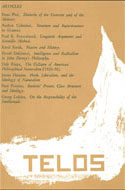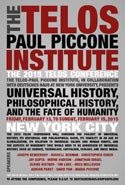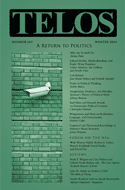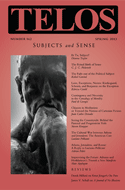By Lukas Szrot · Tuesday, March 24, 2015  Given the rich and diverse history in the discipline of philosophy, many a practicing philosopher might justifiably remark that insightful philosophical inquiry must withstand the test of time. Though “The Collapse of Philosophical Naturalism” was published in Telos in 1969, many of its insights remain highly relevant to conversations that continue in philosophical and sociopolitical circles today. Dale Riepe issues a damning critique, examining four at once distinct and kindred flaws in philosophical naturalism. Given the rich and diverse history in the discipline of philosophy, many a practicing philosopher might justifiably remark that insightful philosophical inquiry must withstand the test of time. Though “The Collapse of Philosophical Naturalism” was published in Telos in 1969, many of its insights remain highly relevant to conversations that continue in philosophical and sociopolitical circles today. Dale Riepe issues a damning critique, examining four at once distinct and kindred flaws in philosophical naturalism.
Continue reading →
By Peter A. Redpath · Friday, March 20, 2015  Anyone familiar with Étienne Gilson’s teachings knows he is celebrated for: being a Thomist, his criticism of “essentialism” in philosophy, emphasizing St. Thomas’s revolutionary focus upon the principle of the act of existence (esse) within the natures of things, and a shift away from ideas to existential judgments within Western philosophical thought. Odd, then, are two claims related to Gilson made by people who knew him well. The first, from Gilson’s biographer Lawrence K. Shook, says of Gilson, “An Erasmian humanist at heart, he wanted to end all wars and to liberate men to work out their salvation in the context of personal freedom. He believed that this could be achieved through the kind of education that fostered the acquisitions of moral virtues through the writings of Cicero and Seneca.” Anyone familiar with Étienne Gilson’s teachings knows he is celebrated for: being a Thomist, his criticism of “essentialism” in philosophy, emphasizing St. Thomas’s revolutionary focus upon the principle of the act of existence (esse) within the natures of things, and a shift away from ideas to existential judgments within Western philosophical thought. Odd, then, are two claims related to Gilson made by people who knew him well. The first, from Gilson’s biographer Lawrence K. Shook, says of Gilson, “An Erasmian humanist at heart, he wanted to end all wars and to liberate men to work out their salvation in the context of personal freedom. He believed that this could be achieved through the kind of education that fostered the acquisitions of moral virtues through the writings of Cicero and Seneca.”
Continue reading →
By Kenneth Rasmussen · Thursday, March 12, 2015  Already in the first third of the 20th century, Karl Jaspers began formulating a philosophy that addressed the collapse of Enlightenment concepts of universal history and offered a perspective that could help us reformulate “universal history” as a viable concept. Jaspers’ work in this area is, I believe, underappreciated, and constitutes a realistic “cosmopolitan vision” that could help us address many of the thorny issues of global cultural conflict and diversity that we face today. Already in the first third of the 20th century, Karl Jaspers began formulating a philosophy that addressed the collapse of Enlightenment concepts of universal history and offered a perspective that could help us reformulate “universal history” as a viable concept. Jaspers’ work in this area is, I believe, underappreciated, and constitutes a realistic “cosmopolitan vision” that could help us address many of the thorny issues of global cultural conflict and diversity that we face today.
Continue reading →
By Dimitris Gakis · Monday, January 12, 2015 Dimitris Gakis’s “Wittgenstein and Marx on Reification, Language, and Commonality” appears in Telos 169 (Winter 2014). Read the full version online at the Telos Online website, or purchase a print copy of the issue in our store.
 The article is primarily occupied with some of the affinities that can be discerned between the philosophical outlooks of (later) Wittgenstein and Marx. Starting from a short account of the connections that can be drawn between Wittgenstein and Marx from a historico-biographical and a metaphilosophical point of view, we focus then on three main points on which their philosophical perspectives converge. The first one has to do with Marx’s concept of reification and Wittgenstein’s deep criticism against those approaches to language and meaning that exhibit reificatory characteristics. The second one is related, first, to their common conception of language as a matter of social praxis and their shared rejection of the idea of a private language and, second, to their common prioritization of everyday language over what they often call metaphysical or philosophical language which they take to be a distorted and deceiving form of everyday language. The third and last point regards the shared emphasis of Wittgenstein and Marx on the notion of the “common” and on the communal aspects of human life and praxis. The article concludes with a reference to some of Wittgenstein’s criticisms against certain aspects of Marxist thought, such as scientism, determinism, and economism, and a brief discussion of how Wittgenstein’s later philosophy may be viewed as a (potentially) significant contribution to the cause of personal and social autonomy. The article is primarily occupied with some of the affinities that can be discerned between the philosophical outlooks of (later) Wittgenstein and Marx. Starting from a short account of the connections that can be drawn between Wittgenstein and Marx from a historico-biographical and a metaphilosophical point of view, we focus then on three main points on which their philosophical perspectives converge. The first one has to do with Marx’s concept of reification and Wittgenstein’s deep criticism against those approaches to language and meaning that exhibit reificatory characteristics. The second one is related, first, to their common conception of language as a matter of social praxis and their shared rejection of the idea of a private language and, second, to their common prioritization of everyday language over what they often call metaphysical or philosophical language which they take to be a distorted and deceiving form of everyday language. The third and last point regards the shared emphasis of Wittgenstein and Marx on the notion of the “common” and on the communal aspects of human life and praxis. The article concludes with a reference to some of Wittgenstein’s criticisms against certain aspects of Marxist thought, such as scientism, determinism, and economism, and a brief discussion of how Wittgenstein’s later philosophy may be viewed as a (potentially) significant contribution to the cause of personal and social autonomy.
Continue reading →
By Telos Press · Monday, September 16, 2013 Karel Kosík and Dialectics of the Concrete Prague, June 4–6, 2014
A conference organised by the Department for the Study of Modern Czech Philosophy, Institute of Philosophy, Academy of Sciences of the Czech Republic.
In 1963 Karel Kosík published his path-breaking book Dialectics of the Concrete. It made an impact on both Marxist and non-Marxist thinkers, in Czechoslovakia and throughout the world. In this work Kosík set for himself an ambitious task—to re-think the basic concepts of the Marxist philosophical tradition and to employ them in the analysis of social reality. In the course of his analysis he touched on a wide array of issues that are still relevant today, including the problem of mystification or the “pseudo-concrete,” the social role of art, the conception of reality as a concrete totality, the conception of the human being as an onto-formative being, the systematic connection between labour and temporality, the relationship between praxis and labour, and the explanatory power of the dialectical method.
Continue reading →
By Russell A. Berman · Monday, March 18, 2013 Telos 162 (Spring 2013) is now available for purchase in our store.
 At its inception, Telos pursued a specific project as a journal: to serve as a bridge between the world of what was then often referred to as “European theory” and a U.S. intellectual world largely defined by quantitative methods in the social sciences. Over time, the terminology changed, and it is now more common to use the parlance of “analytic” and “continental” modes of philosophy, and if the latter term still clearly points toward Europe, there are representatives of both trends in the university lives on both sides of the Atlantic. In retrospect, however, the question for Telos was never one of a simple cultural transfer or the pursuit of some intellectual equilibrium in which scholars in both worlds would think the same way. On the contrary, instead of thinking about method in general, at stake for Telos was the difference between reflections on the meaning of the human condition, thoughtful explorations of the good life, and what appeared to be an exclusively numerical measuring of the status quo, a positivist description of what already exists, with no expectation of change. At its inception, Telos pursued a specific project as a journal: to serve as a bridge between the world of what was then often referred to as “European theory” and a U.S. intellectual world largely defined by quantitative methods in the social sciences. Over time, the terminology changed, and it is now more common to use the parlance of “analytic” and “continental” modes of philosophy, and if the latter term still clearly points toward Europe, there are representatives of both trends in the university lives on both sides of the Atlantic. In retrospect, however, the question for Telos was never one of a simple cultural transfer or the pursuit of some intellectual equilibrium in which scholars in both worlds would think the same way. On the contrary, instead of thinking about method in general, at stake for Telos was the difference between reflections on the meaning of the human condition, thoughtful explorations of the good life, and what appeared to be an exclusively numerical measuring of the status quo, a positivist description of what already exists, with no expectation of change.
Continue reading →
|
|
 Given the rich and diverse history in the discipline of philosophy, many a practicing philosopher might justifiably remark that insightful philosophical inquiry must withstand the test of time. Though “The Collapse of Philosophical Naturalism” was published in Telos in 1969, many of its insights remain highly relevant to conversations that continue in philosophical and sociopolitical circles today. Dale Riepe issues a damning critique, examining four at once distinct and kindred flaws in philosophical naturalism.
Given the rich and diverse history in the discipline of philosophy, many a practicing philosopher might justifiably remark that insightful philosophical inquiry must withstand the test of time. Though “The Collapse of Philosophical Naturalism” was published in Telos in 1969, many of its insights remain highly relevant to conversations that continue in philosophical and sociopolitical circles today. Dale Riepe issues a damning critique, examining four at once distinct and kindred flaws in philosophical naturalism.  Anyone familiar with Étienne Gilson’s teachings knows he is celebrated for: being a Thomist, his criticism of “essentialism” in philosophy, emphasizing St. Thomas’s revolutionary focus upon the principle of the act of existence (esse) within the natures of things, and a shift away from ideas to existential judgments within Western philosophical thought. Odd, then, are two claims related to Gilson made by people who knew him well. The first, from Gilson’s biographer Lawrence K. Shook, says of Gilson, “An Erasmian humanist at heart, he wanted to end all wars and to liberate men to work out their salvation in the context of personal freedom. He believed that this could be achieved through the kind of education that fostered the acquisitions of moral virtues through the writings of Cicero and Seneca.”
Anyone familiar with Étienne Gilson’s teachings knows he is celebrated for: being a Thomist, his criticism of “essentialism” in philosophy, emphasizing St. Thomas’s revolutionary focus upon the principle of the act of existence (esse) within the natures of things, and a shift away from ideas to existential judgments within Western philosophical thought. Odd, then, are two claims related to Gilson made by people who knew him well. The first, from Gilson’s biographer Lawrence K. Shook, says of Gilson, “An Erasmian humanist at heart, he wanted to end all wars and to liberate men to work out their salvation in the context of personal freedom. He believed that this could be achieved through the kind of education that fostered the acquisitions of moral virtues through the writings of Cicero and Seneca.”  The article is primarily occupied with some of the affinities that can be discerned between the philosophical outlooks of (later) Wittgenstein and Marx. Starting from a short account of the connections that can be drawn between Wittgenstein and Marx from a historico-biographical and a metaphilosophical point of view, we focus then on three main points on which their philosophical perspectives converge. The first one has to do with Marx’s concept of reification and Wittgenstein’s deep criticism against those approaches to language and meaning that exhibit reificatory characteristics. The second one is related, first, to their common conception of language as a matter of social praxis and their shared rejection of the idea of a private language and, second, to their common prioritization of everyday language over what they often call metaphysical or philosophical language which they take to be a distorted and deceiving form of everyday language. The third and last point regards the shared emphasis of Wittgenstein and Marx on the notion of the “common” and on the communal aspects of human life and praxis. The article concludes with a reference to some of Wittgenstein’s criticisms against certain aspects of Marxist thought, such as scientism, determinism, and economism, and a brief discussion of how Wittgenstein’s later philosophy may be viewed as a (potentially) significant contribution to the cause of personal and social autonomy.
The article is primarily occupied with some of the affinities that can be discerned between the philosophical outlooks of (later) Wittgenstein and Marx. Starting from a short account of the connections that can be drawn between Wittgenstein and Marx from a historico-biographical and a metaphilosophical point of view, we focus then on three main points on which their philosophical perspectives converge. The first one has to do with Marx’s concept of reification and Wittgenstein’s deep criticism against those approaches to language and meaning that exhibit reificatory characteristics. The second one is related, first, to their common conception of language as a matter of social praxis and their shared rejection of the idea of a private language and, second, to their common prioritization of everyday language over what they often call metaphysical or philosophical language which they take to be a distorted and deceiving form of everyday language. The third and last point regards the shared emphasis of Wittgenstein and Marx on the notion of the “common” and on the communal aspects of human life and praxis. The article concludes with a reference to some of Wittgenstein’s criticisms against certain aspects of Marxist thought, such as scientism, determinism, and economism, and a brief discussion of how Wittgenstein’s later philosophy may be viewed as a (potentially) significant contribution to the cause of personal and social autonomy.  At its inception, Telos pursued a specific project as a journal: to serve as a bridge between the world of what was then often referred to as “European theory” and a U.S. intellectual world largely defined by quantitative methods in the social sciences. Over time, the terminology changed, and it is now more common to use the parlance of “analytic” and “continental” modes of philosophy, and if the latter term still clearly points toward Europe, there are representatives of both trends in the university lives on both sides of the Atlantic. In retrospect, however, the question for Telos was never one of a simple cultural transfer or the pursuit of some intellectual equilibrium in which scholars in both worlds would think the same way. On the contrary, instead of thinking about method in general, at stake for Telos was the difference between reflections on the meaning of the human condition, thoughtful explorations of the good life, and what appeared to be an exclusively numerical measuring of the status quo, a positivist description of what already exists, with no expectation of change.
At its inception, Telos pursued a specific project as a journal: to serve as a bridge between the world of what was then often referred to as “European theory” and a U.S. intellectual world largely defined by quantitative methods in the social sciences. Over time, the terminology changed, and it is now more common to use the parlance of “analytic” and “continental” modes of philosophy, and if the latter term still clearly points toward Europe, there are representatives of both trends in the university lives on both sides of the Atlantic. In retrospect, however, the question for Telos was never one of a simple cultural transfer or the pursuit of some intellectual equilibrium in which scholars in both worlds would think the same way. On the contrary, instead of thinking about method in general, at stake for Telos was the difference between reflections on the meaning of the human condition, thoughtful explorations of the good life, and what appeared to be an exclusively numerical measuring of the status quo, a positivist description of what already exists, with no expectation of change. 






